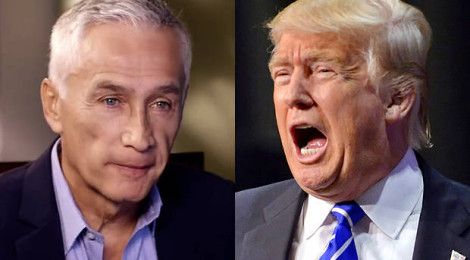
Donald Trump vs. Jorge Ramos
This week, Mediático presents an interesting think piece by Christina Sisk, Associate Professor at the University of Houston and author of Mexico, Nation in Transit: Contemporay Representations of Mexican Migration to the United States (2011), on the Donald Trump/Jorge Ramos confrontation from the summer of 2015. Mediático was delayed in posting Sisk’s piece because it was largely overtaken by the many subsequent Trump news stories (the Trumpkin anyone?) and Trump/Other confrontations which have followed in the months since the Presidential candidate’s diatribe against Mexicans (made during the announcement of his presidential bid) and Trump’s ejection of the Univision news anchor from a press conference. However, the publication of Sisk’s piece remains timely now more than ever given Trump’s continued divisive pronouncements (against women, Muslims, the diasabled, Jewish people), his increasing lead against other Republican Presidential candidates in the GOP polls, and – for those Mediático readers resident in the United Kingdom, his planned trip to the U.K. which has sparked protests from ordinary British people (100,000 of whom have signed a petition to ban him from entering the U.K.) and politicians, who last week debated whether or not to bar him from the country.
Here Sisk explores what is at stake in Trump’s pronoucements against Mexicans, what Ramos was trying to question him about at that fateful press conference and also the corporate and ideological operations at play in the Trump/Ramos showdown.
by Christina Sisk
When Mexico sends its people, they’re not sending their best. […]. They’re sending people that have lots of problems, and they’re bringing those problems with us. They’re bringing drugs. They’re bringing crime. They’re rapists. And some, I assume, are good people.
In the material of some of his campaign speeches as Republican candidate for president of the United States and as part of his campaign strategy outlining his goals, Donald Trump is reverting to the old stereotype of the Mexican immigrant as a criminal and rapist. In one speech Trump points to Francisco Sanchez, who is the alleged murderer of a woman in San Francisco, as the reason why the U.S. border with Mexico should be sealed shut. Sanchez was deported five times and was a felon prior to the murder that he allegedly committed.[1] Trump’s use of Sanchez as representative of Mexican immigrants is problematic because it reduces the characterization of all Mexicans to the crime of one individual. The stereotype does not arise in a vacuum but rather follows a tradition of American culture including cinema of portraying Mexicans as bandidos, bandits, gang members, and drug dealers.[2] Trump’s comments about Mexican immigrants have prompted a number of key figures in both politics and the entertainment industry (Gael Garcia Bernal, America Ferrara) to question the candidate’s reductive characterization of Mexicans, but Jorge Ramos is the only one who has directly questioned Trump on why this characterization is part of his political platform.
When Ramos spoke up at Trump’s press conference he was trying, as a Mexican journalist living and working in the United States, to ask Trump about his position against legalizing eleven million undocumented immigrants. But Trump reacted by having Ramos thrown out of the press conference, (supposedly because the journalist did not wait his turn to ask his question) and then pretended not to have thrown him out at all. When Ramos began speaking, Trump told him, “Go back to Univision”[3] implying that Ramos should go back to Mexico, but the presidential candidate also demonstrated that he views Spanish language media as foreign and not part of the United States mediascape. Ramos may be Mexican by birth, but he is also a U.S. citizen. And Univision, the largest of a number of Spanish-language networks in the U.S. may broadcast predominantly Mexican content (Televisa telenovelas in its prime-time slots), but it broadcasts from the U.S. to a U.S.-based Latino population. Since the confrontation between the two, some (including Fox commentator Bill O’Reilly) have accused Ramos of undermining his role as a journalist by becoming an activist. Such speculation attempts to discredit Ramos by suggesting he is not an objective observer.
As Ramos himself asserts, he is not an activist; he represents Univision and its joint venture with Disney, Fusion, which have a different ideological following to other networks such as CNN or the conservative Fox News. In many ways, Ramos is not that different from his counterparts, the news anchors at the other networks, because all of the networks represent different ideological positions, whether they like to admit it or not. Although Univision[4] speaks largely to a Spanish speaking audience, it also rivals with the other major networks for this audience, and through Fusion and its multimedia platform, is attempting to make inroads into the English language market.[5] As an anchor and a journalist of a major network, Ramos reaches out to his viewers and his supporters and does so as part of a corporate media strategy that caters to a Spanish-speaking audience, one that supports immigration reform. While Ramos’ questioning of Trump points to a distinct ideological position in comparison to his colleagues, it is also a commercial tactic to gain and capture an audience. While this places him on the left of the English-language networks, the move is actually far more conservative than it appears.
One might be tempted to see Donald Trump as a menace and Jorge Ramos as a savior, but both are more than just individuals. They represent corporations that engage in the political arena as part of their strategies to capture a large audience. The presidential candidate’s approval ratings have surged since Ramos has become a vocal opponent of the divisive policies Trump is advocating. Whether Trump wants to admit it or not, he will have to contend with Ramos and Univision. While the Spanish-language media and its viewers were once easy to ignore, they are increasingly changing the political conversation in the United States and taking it in a different direction.
[1] http://www.cnn.com/2015/07/03/politics/trump-san-francisco-killing/index.html
[2] For more information on the common stereotypes of Latinos, see:
Ramírez Berg, Charles. Latino Images in Film: Stereotypes, Subversion, and Resistance. Austin: University of Texas Press, 2002.
[3] money.cnn.com/2015/08/26/media/univision-jorge-ramos-donald-trump/index.html
[4] http://www.huffingtonpost.com/2014/08/01/unvision-number-1-network_n_5642872.html
[5] http://abcnews.go.com/Business/abc-news-univision-announce-cable-network-called-fusion/story?id=18468776






